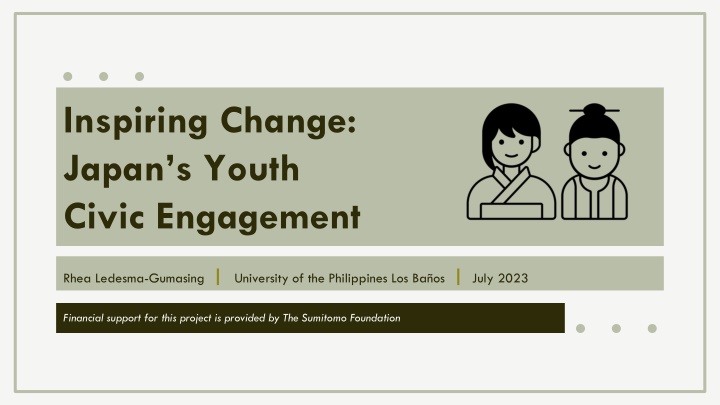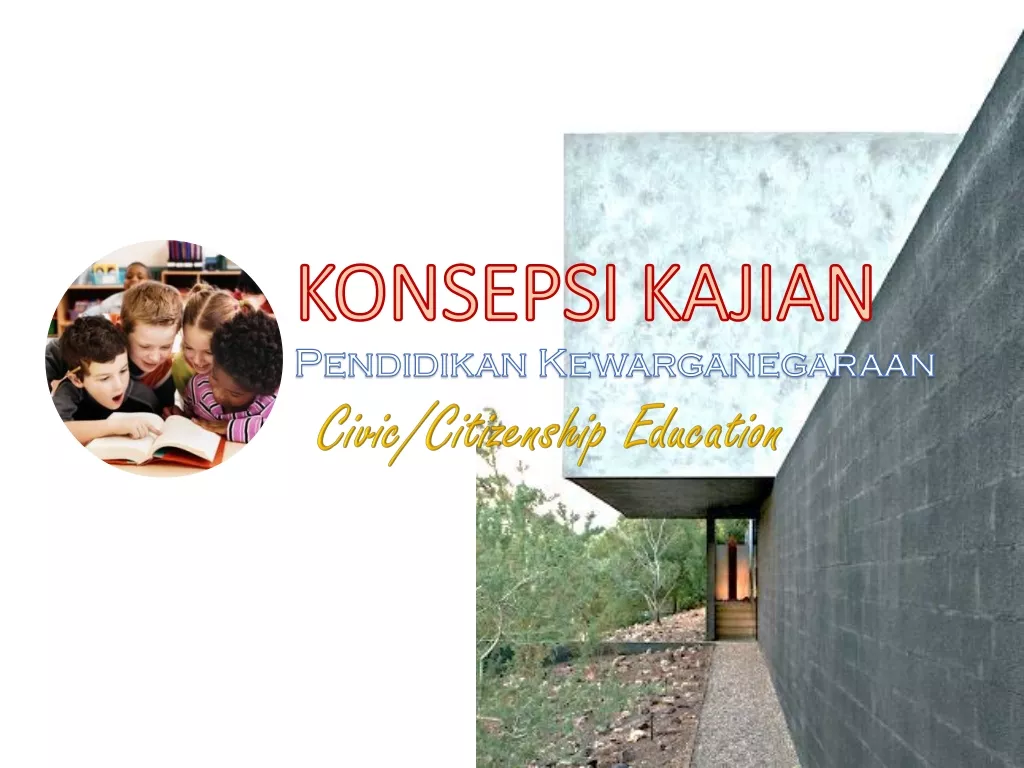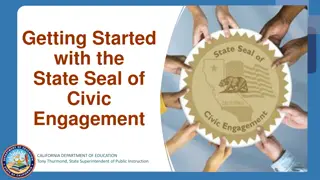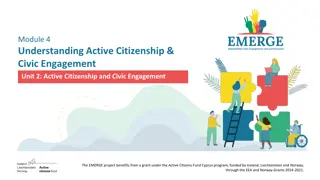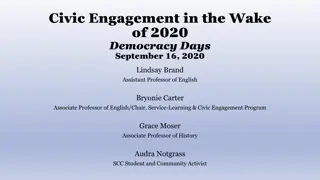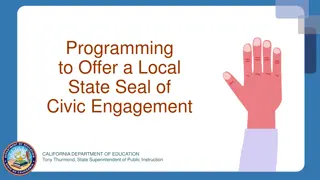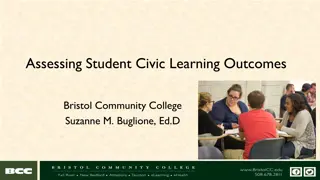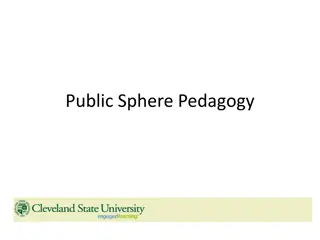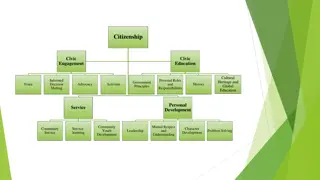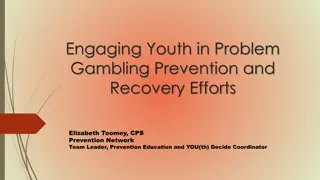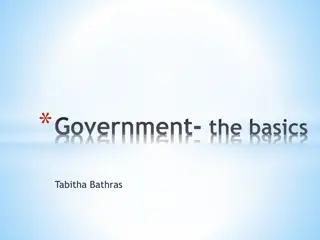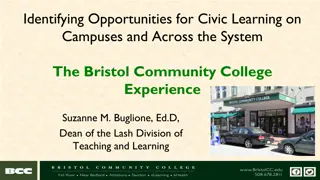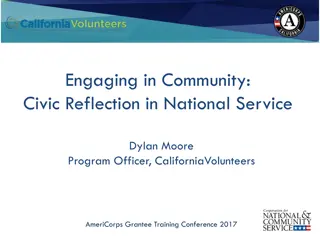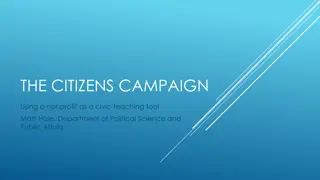Inspiring Change: Japan's Youth Civic Engagement Study
This study explores the civic engagement of Japan's youth, focusing on factors influencing their involvement in societal issues. With a sample size of 138 respondents aged 18-29 in major cities, the research delves into cognitive, affective, and psychomotor domains of engagement, aiming to enhance understanding and promote active participation.
Download Presentation

Please find below an Image/Link to download the presentation.
The content on the website is provided AS IS for your information and personal use only. It may not be sold, licensed, or shared on other websites without obtaining consent from the author.If you encounter any issues during the download, it is possible that the publisher has removed the file from their server.
You are allowed to download the files provided on this website for personal or commercial use, subject to the condition that they are used lawfully. All files are the property of their respective owners.
The content on the website is provided AS IS for your information and personal use only. It may not be sold, licensed, or shared on other websites without obtaining consent from the author.
E N D
Presentation Transcript
Inspiring Change: Japan s Youth Civic Engagement Rhea Ledesma-Gumasing | University of the Philippines Los Ba os | July 2023 Financial support for this project is provided by The Sumitomo Foundation
Rationale Public distrust of politics is particularly noticeable among young people in their 20s and 30s (Genron-NPO 2019) Crisis of civic and political engagement among young people has been observed (Barrett, 2018) Motivated by; Public Election Law of 2015
Objectives 01 02 03 Measure civic engagement in three domains: cognitive, affective, and psychomotor, and how it relates to social cohesion Identify the motivations and hindrances in civic engagement Describe how to further civic engagement among the youth
Methodology This study has 138 respondents Scope and Sampling Ages are between 18-29 years old Survey locations: Kyoto, Osaka, Nagoya and Tokyo, which are among the most populous cities in Japan (Statistics Bureau 2021)
Online surveys, face- to-face interviews, and focus group discussions were conducted Methodology Data collection and analysis Thematic, descriptive, and cross tabs, factor analyses were done
Results Cognitive On average, 21.92% of the respondents engage daily in matters affecting their community 33% discuss political and public affairs weekly, many of them in college (34%) and high school (32%) 41% read about civic or political affairs weekly, most of them are high school (45%) and postsecondary students (43%) 37% observe or listen to such issues weekly, most of whom are college students 39% watch news about civic or political issues daily or weekly, most of whom are college students
Results Affective Least participate in: taking part in a protest, attending a political meeting, or volunteering related to the PWD and the LGBT community Volunteer work on environment and disaster response (30.08%) or in education (15.94%) On average, more than 90% of the respondents in the last 12 months have not interacted physically with the community Some youth are concerned with social issues but may be less involved in participating in political/social affairs
Results Psychomotor Post-graduate respondents: High school respondents: 29% have initiated environmental clean-ups 98% have not organized nor initiated activities, whether online or face-to-face, related to civic and political affairs in the last 24 months 17% have initiated activities related to education such as tutorials and seminars 14% have helped conduct seminars on nutrition, senior citizens and persons with disabilities, and voters education rights 14% disaster relief operations
Results Social Cohesion The relationships that they have formed within their community from their neighbors to their schools, to their workplaces, and their relatives -- contribute to the positive way they look at their community Almost 95% of 138 respondents indicate that they view their community positively. 94.2% believe they can impact their community in various ways
Results Social Cohesion and civic engagement There is a strong linear relationship There is a strong linear relationship between social cohesion and civic between social cohesion and civic engagement among the youth engagement among the youth surveyed surveyed. .
Results Motivations Youth are motivated when it is relevant to their interests Social contract They have free time As members of the collective group (Japanese society), it is the duty of the citizens to participate in civic causes where it speaks to them Their participation may be a mechanism of finding oneself, or as part of being curious on what goes on in society, or for some, due to social pressure (peers/family) As individual members of society, they have an obligation/potential to contribute to change processes
Results Hindrances Limited capacities and access to information Lack of solidarity with the community or a societal cause These may be because majority of the respondents are either in high school or are still doing undergraduate courses There is simply no motivation to join as it is at the bottom of their priority list They are not interested in politics; these efforts have little impact in society Participation may also be constrained since they do not receive communication on such matters
How to further civic engagement Results Access to information Social pressure Seeing family and friends participate in civic activities is a big motivation for the youth to also engage in such Providing education and awareness can help the youth understand the importance of participating in the democratic process Having positive role models who are civically engaged can inspire the youth to become more involved It puts a pressure on them It encourages them
Conclusion Overall, surveyed youth in Japan, are civically engaged. Among the three domains, the cognitive showed a positive insight while the affective and psychomotor aspects show the least engagement. Engaged in personal interests: Environment or education
Conclusion In general, those surveyed youth in Japan, at varying levels, think they have an impact in making their community better Whichever reason it may be, an intersection can be found: As citizens, they have individual and collective rights, and it is part of their social contract to claim these rights and make change possible.
Conclusion Motivation to engage happens when it is relevant to their interests or when they feel social solidarity to a community Social pressure and access to information can further civic engagement among the youth
Conclusion There is hope that civic engagement of Japanese youth could increase Their lack of motivation or interest in civic, political, and social movements is not a result of their character, but of limited resources and structural or economic circumstances. Giving them the right information and opportunity to contribute to or influence public decisions that affect themselves and their respective communities could encourage them to take part and act.
References Avenell, S. A. (2009). Civil Society and the New Civic Movements in Contemporary Japan: Convergence,Collaboration, and Transformation. The Journal of Japanese Studies, 35(2), 247 283. http://www.jstor.org/stable/27756657 Cabinet Office (2104). White Paper on Children and Youth http: www8.cao.go.jp/youth/white-paper/h26honpen/pdf_index.html Genron-NPO (2019). https://www.genron-npo.net/en/opinion_polls/archives/5496.html (accessed may 10, 2023) Hoffman, https://www.japantimes.co.jp/news/2020/01/25/national/media -national/decline-social-engagement-may-betray-democracy/ M. (2020). The decline of social engagement may betray democracy, the Japan times National Youth Development Policy (2008). https://www8.cao.go.jp/youth/suisin/taikou_201212/pdf/taikou_e.pdf Schoppa, L. (2012) Residential Mobility and Local Civic Engagement in Japan and the United States: Divergent Paths to School, Comparative Political Studies 46 (9) 1058-1081 Solis, M. (2021). Japan s democratic renewal and the survival of the liberal order. Brookings. https://www.brookings.edu/articles/japans-democratic- renewal-and-the-survival-of-the-libera order/Japan s democratic renewal and the survival Statistics Bureau. 2021. Statistical Handbook of Japan. Statistics Bureau, Ministry of Internal Affairs and Communications, Japan. Available on https://www.stat.go.jp/english/data/handbook/pdf/2021all.pdf (accessed April 2022). United Nations. (n.d.). Definition of Youth . Available on https://www.un.org/esa/socdev/documents/youth/fact-sheets/youth-definition.pdf (accessed April 2022).
Thank you. Questions? For more information about this study, please contact: rlgumasing@up.edu.ph This presentation template was created by Slidesgo.
